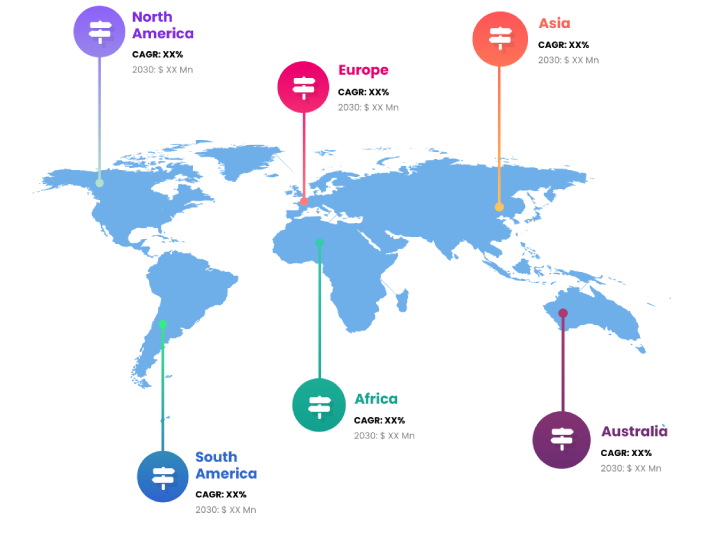
Consumer tastes and desires for better snack options have been shifting in the women's health therapeutics industry worldwide in recent years. Perception of fruit snacks as a convenient and somewhat healthy option has contributed to the market's resiliency and consistent expansion. Snacks that are low in calories, natural, and produced with actual fruit ingredients are in high demand as consumers grow more health concerned. The sector is anticipated to be significantly impacted by this trend led by health. Companies in the fruit snack industry are also spending money on new products. Organic, non-GMO, and clean-label fruit snacks are being introduced to cater to the needs of health-conscious consumers. To reach a wider audience, we are also looking into different flavor profiles and packaging choices.
Therapeutic area, indication, distribution channel, and geography are the four main pillars upon which the worldwide women's health therapeutics market rests. Hormone treatments, birth control pills, and other reproductive health medications are categorized according to their type. Menopause, hormone-related malignancies, contraception, reproductive diseases, and other indications form its two main branches. Pharmacy chains, retail pharmacies, internet pharmacies, and others make up the various distribution channels. There are five main geographic divisions in the global market: the Americas, Europe, Asia-Pacific, Latin America, and the Middle East and Africa.
The market growth dimensions will be shaped by favorable NIH initiatives such as WHISH, WHISPER, and OPACH, which stand for Physical Activity and Cardiovascular Health Study. Additionally, the ever-increasing prevalence of chronic and lifestyle-related illnesses among women would further enhance the dynamics of the women's health therapeutics industry. The women's health therapeutics market will also benefit from rising investments in healthcare research events and oncology and breast cancer research. The women's health therapeutics market is expected to have a meteoric growth in the next years, thanks to the increasing number of pregnancy-related complications and the introduction of new therapeutic medications to treat these issues.
A number of factors, including rising cancer, infection, menopause, and osteoporosis awareness, will contribute to the expansion of this industry. Efficacious new pharmaceutical therapies unveiled by pharmaceutical industry heavyweights will pave the way for a prosperous future in the women's health therapeutics sector. This market will continue to grow in the next years due to rising gynecological problems and female infertility rates. From 2020 to 2026, the market is expected to be propelled by healthcare-focused government programs in both developed and developing nations.
Modern medicinal treatments for menopause, reproductive diseases, and hormone imbalances are in high demand due to the growing public interest in women's health issues. Precision medicine and new medication formulations are two examples of how healthcare technology is driving therapeutic innovation. The complex regulatory landscape and lengthy approval processes for women's health products are major obstacles that slow down product releases and have a major influence on the market. Both patients and regulators are wary of therapeutic interventions due to worries about possible adverse effects and safety concerns. There are already gender gaps in healthcare access and clinical research, which makes it harder to create treatments for women's health that are both thorough and applicable to everyone.
According to research into the worldwide market for women's health treatments, there are a lot of interesting developments and challenges in this dynamic industry. Rising consumer consciousness and new innovations in healthcare are fueling the market for niche products that address specific issues, such as reproductive health and menopause. But there are limitations due to safety concerns and strict regulatory procedures. Most products fall within the categories of hormone treatments and contraceptives. The increased healthcare consciousness in North America has put it in first place, but the region of Asia-Pacific shows great promise for future expansion. Personalized medicine and new forms of birth control are two important current topics. Innovation, regulatory scrutiny, and regional healthcare dynamics are all factors shaping the market's direction, which highlights the industry's dedication to improving healthcare for women.
Report Coverage
Global Women's Health Therapeutics research report categorizes the market for global based on various segments and regions, forecasts revenue growth, and analyzes trends in each submarket. Global Women's Health Therapeutics report analyses the key growth drivers, opportunities, and challenges influencing the global market. Recent market developments and Women's Health Therapeutics competitive strategies such as expansion, product launch and development, partnership, merger, and acquisition have been included to draw the competitive landscape in the market. The report strategically identifies and profiles the key Women's Health Therapeutics market players and analyses their core competencies in each global market sub-segments.
| REPORT ATTRIBUTES | DETAILS |
|---|---|
| Study Period | 2017-2031 |
| Base Year | 2023 |
| Forecast Period | 2023-2031 |
| Historical Period | 2017-2021 |
| Unit | Value (USD Billion) |
| Key Companies Profiled | Pfizer Inc. (United States), Bayer AG (Germany), Novartis AG (Switzerland), GlaxoSmithKline plc (United Kingdom), Merck & Co., Inc. (United States), AbbVie Inc. (United States), Eli Lilly and Company (United States), AstraZeneca plc (United Kingdom), Johnson & Johnson (United States), Teva Pharmaceutical Industries Ltd. (Israel), Eisai Co., Ltd. (Japan), Otsuka Pharmaceutical Co., Ltd. (Japan), Shionogi & Co., Ltd. (Japan), Mitsubishi Tanabe Pharma Corporation (Japan), Daiichi Sankyo Company, Limited (Japan), Astellas Pharma Inc. (Japan), Sanofi (France), Bristol Myers Squibb Company (United States), Allergan plc (Ireland), F. Hoffmann-La Roche Ltd., Abbott Laboratories, and Novo Nordisk A/S. |
| Segments Covered | • By Product |
| Customization Scope | Free report customization (equivalent to up to 3 analyst working days) with purchase. Addition or alteration to country, regional & segment scope |
Key Points Covered in the Report
- Market Revenue of Women's Health Therapeutics Market from 2021 to 2031.
- Market Forecast for Women's Health Therapeutics Market from 2021 to 2031.
- Regional Market Share and Revenue from 2021 to 2031.
- Country Market share within region from 2021 to 2031.
- Key Type and Application Revenue and forecast.
- Company Market Share Analysis, Women's Health Therapeutics competitive scenario, ranking, and detailed company
profiles. - Market driver, restraints, and detailed COVID-19 impact on Women's Health Therapeutics
Market
Competitive Environment:
The research provides an accurate study of the major organisations and companies operating in the global Women's Health Therapeutics market, along with a comparative evaluation based on their product portfolios, corporate summaries, geographic reach, business plans, Women's Health Therapeutics market shares in specific segments, and SWOT analyses. A detailed analysis of the firms' recent news and developments, such as product development, inventions, joint ventures, partnerships, mergers and acquisitions, strategic alliances, and other activities, is also included in the study. This makes it possible to assess the level of market competition as a whole.
List of Major Market Participants
Pfizer Inc. (United States), Bayer AG (Germany), Novartis AG (Switzerland), GlaxoSmithKline plc (United Kingdom), Merck & Co., Inc. (United States), AbbVie Inc. (United States), Eli Lilly and Company (United States), AstraZeneca plc (United Kingdom), Johnson & Johnson (United States), Teva Pharmaceutical Industries Ltd. (Israel), Eisai Co., Ltd. (Japan), Otsuka Pharmaceutical Co., Ltd. (Japan), Shionogi & Co., Ltd. (Japan), Mitsubishi Tanabe Pharma Corporation (Japan), Daiichi Sankyo Company, Limited (Japan), Astellas Pharma Inc. (Japan), Sanofi (France), Bristol Myers Squibb Company (United States), Allergan plc (Ireland), F. Hoffmann-La Roche Ltd., Abbott Laboratories, and Novo Nordisk A/S.
Primary Target Market
- Market Players of Women's Health Therapeutics
- Investors
- End-users
- Government Authorities
- Consulting And Research Firm
- Venture capitalists
- Third-party knowledge providers
- Value-Added Resellers (VARs)
Market Segment:
This study forecasts global, regional, and country revenue from 2019 to 2031. INFINITIVE DATA EXPERT has segmented the global Women's Health Therapeutics market based on the below-mentioned segments:
Global Women's Health Therapeutics Market, By Therapeutic Area
Hormone Therapies
Contraceptives
Reproductive Health Drugs
others
Global Women's Health Therapeutics market, By Indication
Menopause
Contraception
Hormone-related Cancers
Reproductive Disorders
others
Global Women's Health Therapeutics Market, By Distribution channel
Hospital Pharmacies
Retail Pharmacies
Online Pharmacies
Others
Global Women's Health Therapeutics market, Regional Analysis
- Europe: Germany, Uk, France, Italy, Spain, Russia, Rest of Europe
- The Asia Pacific: China,Japan,India,South Korea,Australia,Rest of Asia Pacific
- South America: Brazil, Argentina, Rest of South America
- Middle East & Africa: UAE, Saudi Arabia, Qatar, South Africa, Rest of Middle East & Africa
You will get in-depth and extensive women s health therapeutics market market research and competitor analysis for your business to help you develop more profound insights into the women s health therapeutics market Market.
Through INFINITIVE Data Expert is a professional Market Research services, I will identify the women s health therapeutics market market size, demand & opportunities, growth rate, and target audience with a comprehensive analysis of your competitors.



